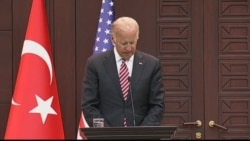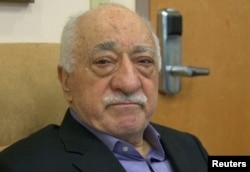U.S. Vice President Joe Biden has said the United States had no prior knowledge of the Turkish coup and would never support the treasonous behavior of the military.
He spoke to the press after meeting Turkish Prime Minister Binali Yildirim in Ankara Wednesday. Biden said the U.S. will provide any assistance Turkey needs as it moves to strengthen its democracy and that the United States puts paramount importance on its relationship with Turkey, a crucial NATO ally.
WATCH: VP Biden on Turkish cleric Fethullah Gulen
Biden arrived in Turkey earlier in the day, as Turkish military forces launched their first offensive into Syria to target Islamic State militants and Kurdish fighters.
U.S. warplanes aided the Turkish military incursion. The vice president will also meet with President Recep Tayyip Erdogan.
Biden is President Barack Obama's highest-ranking and closest surrogate, often representing the White House in difficult diplomatic situations. He is known for cultivating personal relationship with world leaders, including with Erdogan, whom he calls an "old friend."
Calls for extradition
In Ankara Wednesday, Erdogan again called on the United States to extradite Turkish cleric Fethullah Gulen, who is blamed for backing the failed July coup. The U.S. State Department said Tuesday that it has received an extradition request for the 75-year-old Gulen from Turkey, however the request is not explicitly linked to his alleged role in planning the plot.
U.S. Justice Department officials say a decision on the extradition request will be based on evidence and the rules of the two countries’ extradition treaty.
Biden and Erdogan are also likely to discuss their joint efforts to combat the Islamic State terrorist group. Turkey has the second largest military force in NATO and is also part of the U.S-led coalition to combat the Islamic State in Iraq and Syria. In recent months, Turkey has been a frequent target of IS terrorist attacks.
Biden arrives at a time of tense ties between Ankara and Washington.
Many Turks say they are angry about what they see as a lack of solidarity from the West after the traumatic coup, which left at least 240 people dead and included the bombing of the Turkish parliament. Turkish analyst Kemal Kirisci told VOA most people in Turkey feel the West has been too critical and not shown enough sympathy.
“In the Turkish public’s mind there is a puzzlement, why is it, ….why is it that it has taken such a long time for a very long-standing ally of Turkey to express solidarity and to manifest that solidarity with a visit to Turkey? And that also applies to the EU.”
Kirisci pointed out that Erdogan recently had a supportive meeting with Russian President Vladimir Putin-a meeting that had already been planned before the coup.
But human rights groups and many in the West are concerned that Ankara has fired or suspended nearly 80,000 government employees and soldiers since the failed coup in a massive crackdown on the military, civil service, police, academia and judiciary.
The Gulen issue
One of the thorniest issues is likely to be the fate of the U.S.-based Turkish cleric Fethullah Gulen.
Turkish President Erdogan blames the 75-year-old Gulen for planning the coup and is demanding that Washington turn him over right away: "We say to America: 'Aren't we strategic partners? Don't we have extradition treaties?' If that's the case, when you ask for terrorists [to be extradited] we didn't ask for documents.”
Gulen and Erdogan are former allies who are now enemies. Gulen has lived in self-imposed exile in Pennsylvania for 17 years. His mystic Islamic movement runs schools, charities and businesses around the world. At his Pennsylvania compound, Gulen told VOA’s Turkish Service he was not involved in the coup and condemned the violence.
His lawyer, Reid Weingarten had this to say: “It would be unprecedented and appalling if the United States took a frail, almost octogenarian, plopped him on a plane to go back into that kind of setting with the hideous things that are being said about him by the entire Turkish government.”
Biden is likely to be pressed to release Gulen, and will likely repeat in Ankara what Press Secretary Earnest explained Monday: “There is a treaty, an extradition treaty that's been on the books between United States and Turkey for more than 30 years.”
Earnest said some U.S. Justice Department officials will travel to Turkey this week to meet with their Turkish counterparts and review some of the evidence against Gulen they have collected. He said the Justice Department will make the decision based on evidence and the rules on the extradition treaty. He insists that it is not a presidential decision.
At Tuesday’s State Department briefing, spokesman Mark Toner confirmed to reporters that formal extradition requests for Gulen have been received from Turkey. Reporters were surprised to hear Toner say that the extradition requests for Gulen are not related to the July, 2016 coup. Toner stressed that the extradition request is not a public process, and that there is an ongoing “sober, deliberate assessment” of tranches of documents that have been sent by Turkey on Gulen.
The Islamic State Issue
Biden and Erdogan are also likely to discuss their joint efforts to combat the Islamic State terrorist group. Turkey has the second largest military force in NATO and is also part of the U.S.-led coalition to combat the Islamic State in Iraq and Syria. In recent months, Turkey has been a frequent target of IS terrorist attacks.
More than 50 people were killed in a suicide bombing attack on a Kurdish wedding in the southeastern city of Gaziantep, believed to have been directed by the Islamic State group. The U.S. has repeatedly called on Turkey to boost its efforts to secure it border with Syria, to prevent terrorist fighters from crossing.
White House Correspondent Cindy Saine and Senior Diplomatic Correspondent Steve Herman contributed to this report.










